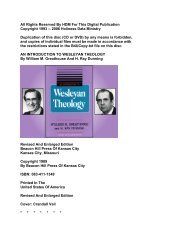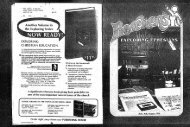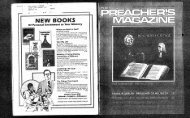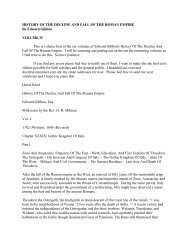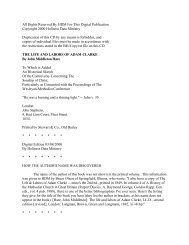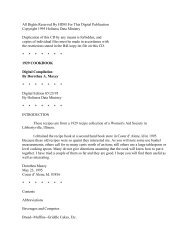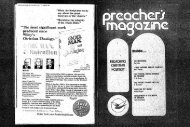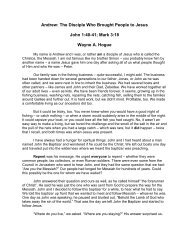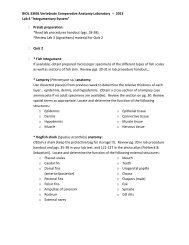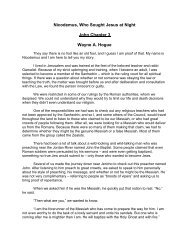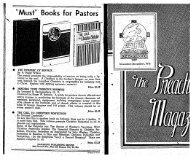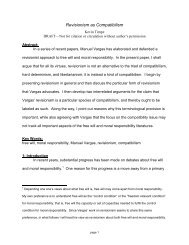Rights Reserved By HDM For This Digital - The Wesley Center Online
Rights Reserved By HDM For This Digital - The Wesley Center Online
Rights Reserved By HDM For This Digital - The Wesley Center Online
- No tags were found...
You also want an ePaper? Increase the reach of your titles
YUMPU automatically turns print PDFs into web optimized ePapers that Google loves.
<strong>The</strong> next holiday in the year is Rash Hashanah, which is New Year. <strong>This</strong> comes usually in<br />
Tishri, or September. <strong>The</strong> strange thing about this New Year is that April, the month of Nisan or<br />
Abib is the first Biblical month of the year, that is, the first recorded month of creation. Its name<br />
really means Spring. Though this is the Biblical beginning of the Jewish year, the traditional<br />
beginning, that which the rabbis have incorporated into the Talmud, is really the Feast of Trumpets<br />
or the blowing of the rams' horns and trumpets to call the people together for a holy convocation,<br />
which takes place in the seventh month, the month of Tishri. We read about this in the book of<br />
Leviticus. "In the seventh month in the first day of the month shall ye have a Sabbath." <strong>The</strong> seventh<br />
month is to the year what Saturday is to the week. In the book of Nehemiah 8:1-12, we read that<br />
after Israel had come out of Babylon again they were to observe the New Year very solemnly.<br />
When the people heard the law read, they stood for hours. <strong>The</strong>re was such rejoicing and praising<br />
and shouting that they could be heard for miles. <strong>The</strong>y did not even want to eat. In fact, Ezra had to<br />
tell them to go home and eat. <strong>The</strong> blowing of the rams' horns reminds them of how Abraham was<br />
willing to give up his son and God provided the ram to take Isaac's place, even as the Lord Jesus<br />
Christ became our ram.<br />
Between Rosh Hashanah and the time of the next holiday, which is Yom Kippur, are ten<br />
awesome days of repentance when men should be searching their hearts. Tradition has it that there<br />
are three books to be opened during this time -- one book in which all the righteous are registered,<br />
the second book in which those who are not wholly righteous or utterly wicked are registered, and<br />
the third in which only the wicked are recorded. Of course, their desire is that their names should<br />
be inscribed in the first book. During the ten days of repentance, they should also be seeking to<br />
make peace with those whom they have wronged throughout the year, with their enemies if they<br />
have any. It is a time when charities are given to the poor, and when long written prayers are<br />
repeated. Often their litany is much like our own praying.<br />
Yom Kippur is the Day of Atonement. <strong>The</strong> elaborate ritual for the Day of Atonement is<br />
observed in the synagogue or temple, as described in Leviticus 16. <strong>For</strong> this they need a sacrifice<br />
for the sins they have been repenting of for the last ten days. It is a very solemn day. <strong>The</strong> real<br />
orthodox Jews walk to their synagogue, no matter how far away they live. <strong>The</strong>y will not ride in a<br />
conveyance, neither will they allow themselves any luxuries during this Yom Kippur (twenty-four<br />
hours). From one sundown to the next sundown, Jews the world over, male and female, young and<br />
old, fast and seek atonement or forgiveness for all their sins. In Old Testament times, they made<br />
preparation for this. <strong>The</strong>y offered a sacrifice. Among the real orthodox Jews today a chicken is<br />
offered, but God never said that a chicken would atone for sin. Neither did the blood of bullocks<br />
and goats, for that matter, so Isaiah tells us. Even if the Jews were to bring an offering today, there<br />
is no place for it to be offered, no brazen altar, no holy of holies. <strong>The</strong>ir temple has been destroyed.<br />
In the evening after the twenty-four-hour fast, the cantor begins the most solemn prayer in the Yom<br />
Kippur devotions. <strong>This</strong> is known as the Kol Nidre, or all vows to God. He repeats their vows,<br />
their oaths, their devotions, their promises, their penalties, their obligations, everything they have<br />
sworn to God.<br />
At the close of the Yom Kippur solemnities, they repeat a beautiful prayer, which is almost<br />
along the same plaintive, wistful lines as Isaiah 53. <strong>This</strong> is the prayer: "Our righteous Messiah has<br />
departed from us. We are horror-stricken and have none to justify us. Our iniquities and the yoke of



